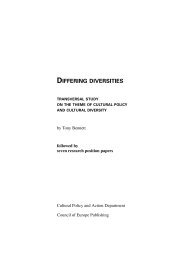Why we need European cultural policies: the impact of EU ...
Why we need European cultural policies: the impact of EU ...
Why we need European cultural policies: the impact of EU ...
You also want an ePaper? Increase the reach of your titles
YUMPU automatically turns print PDFs into web optimized ePapers that Google loves.
<strong>the</strong> Draft Treaty Establishing a Constitutionfor Europe, as adopted by <strong>the</strong> <strong>European</strong>Commission in July 2003 and by <strong>the</strong><strong>European</strong> Council in June 2004.39 Art III-181 <strong>of</strong> <strong>the</strong> Draft ConstitutionalTreaty40 Art III-217 <strong>of</strong> <strong>the</strong> Draft ConstitutionalTreaty41 Term `l’exception culturelle’ firstappeared sometime bet<strong>we</strong>en 1986 and1994, during <strong>the</strong> so-called Uruguay round<strong>of</strong> prolonged world trade negotiationsabout GATS (General Agreement on Tradein Services). The member states <strong>of</strong> <strong>the</strong><strong>European</strong> Communities, under strong Frenchinfluence, did not <strong>of</strong>fer to liberalize certainservices in <strong>cultural</strong> sectors and includednumerous exceptions from <strong>the</strong> MFN principle(Most Favoured Nation Clause). <strong>European</strong>states refused to <strong>of</strong>fer liberalization <strong>of</strong> audiovisualservices as <strong>we</strong>ll as those related tolibraries, archives and museums. Ho<strong>we</strong>ver,it is important to note that in fact exception<strong>of</strong> culture does not really exist as such. The<strong>EU</strong> has agreed in December 1993 thatculture is a part <strong>of</strong> GATS but did not makecommitments.43 At <strong>the</strong> Informal Council <strong>of</strong> <strong>EU</strong> Ministers<strong>of</strong> Culture and Audio-visual in May 2003, itwas stressed that <strong>the</strong> enlargement toge<strong>the</strong>rwith <strong>the</strong> discussion on <strong>the</strong> future <strong>of</strong> Europeare two developments which raise <strong>the</strong> issue<strong>of</strong> <strong>the</strong> <strong>European</strong> <strong>cultural</strong> identity as a basisfor <strong>the</strong> operation <strong>of</strong> <strong>the</strong> internal market in <strong>the</strong>sectors <strong>of</strong> culture and audio-visual and <strong>the</strong>question <strong>of</strong> <strong>the</strong> position <strong>of</strong> culture and <strong>cultural</strong>policy in <strong>the</strong> future <strong>European</strong> Constitution.The ministers also established a clear linkbet<strong>we</strong>en <strong>the</strong> discussion on <strong>the</strong> <strong>European</strong><strong>cultural</strong> identity after <strong>the</strong> 2004 enlargementand <strong>the</strong> functioning <strong>of</strong> <strong>the</strong> economy <strong>of</strong> leisure,<strong>the</strong> tourist market and <strong>the</strong> <strong>cultural</strong> industries.They recognized also a direct link bet<strong>we</strong>en<strong>the</strong> <strong>need</strong> for protecting and promoting <strong>the</strong>identity <strong>of</strong> member states with <strong>the</strong> discussionon <strong>the</strong> institutional and political image andperspective <strong>of</strong> <strong>the</strong> <strong>EU</strong>, as <strong>we</strong>ll as its positionin <strong>the</strong> world.Ho<strong>we</strong>ver, even though <strong>the</strong>y recognizedthat existing measures for <strong>the</strong> promotion<strong>of</strong> <strong>European</strong> culture are necessary butnot sufficient and that <strong>the</strong>re is a <strong>need</strong>for more active <strong>cultural</strong> policy, <strong>the</strong>y onceagain concluded that <strong>the</strong>y insisted on <strong>the</strong>respect <strong>of</strong> <strong>the</strong>ir primary competence in <strong>the</strong>field <strong>of</strong> culture, and thus turned once againexclusively towards increasing <strong>the</strong> communitybudget distributed in <strong>the</strong> field <strong>of</strong> cultureand audio-visual as <strong>we</strong>ll as towardsimprovement <strong>of</strong> existing instruments in<strong>the</strong> audio-visual sector.42 In <strong>the</strong> final chapter <strong>of</strong> this study, whenreflecting on current and future development<strong>of</strong> <strong>the</strong> <strong>European</strong> <strong>cultural</strong> policy, I will fur<strong>the</strong>rexplain why I believe that this approachcannot <strong>of</strong>fer a solution for major challenges <strong>of</strong>contemporary <strong>cultural</strong> <strong>policies</strong> in <strong>the</strong> long run.44 Draus F, (2001)`Est-Ouest, le dit et le non dit.’, Sociétal, no 32.82Notes














